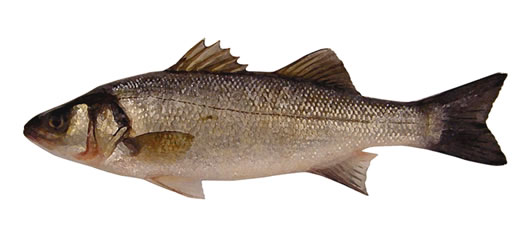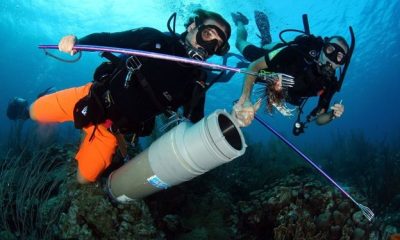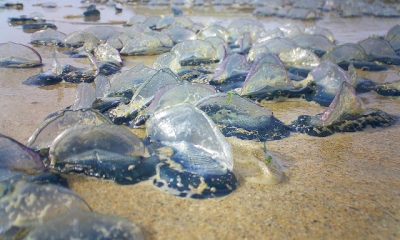News
Seabass sinking into deep trouble as European states fail to agree on adequate rescue package

Iconic fish faces uncertain future, says Marine Conservation Society, and drastic measures are required to protect the stock
The UK’s leading marine charity, the Marine Conservation Society (MCS), says a fish that has become a restaurant favourite in recent years requires urgent help from European states if the fishery is to be saved from a complete crash. The charity says a temporary ban on all fishing for seabass should not be discounted.
Seabass is an iconic species which is popular with both restaurants and retailers, but one that has been subject to overfishing for many years. Since 2008, recruitment of young fish into the main seabass stock in the Northeast Atlantic has been poor, and since 2010, the size of the population has been rapidly decreasing and is on track to plummet to levels from which it may struggle to recover. The latest scientific advice from the International Council for the Exploration of the Sea (ICES) indicates the situation for seabass is getting worse.
Samuel Stone, Fisheries Officer at the Marine Conservation Society, says that not enough is being done to reverse the fortunes of seabass: “Lack of agreement between EU member states over how to manage this valuable stock leaves the fish and its fishermen facing a very uncertain future. Fishery management measures that sufficiently reduce catches are urgently needed to reverse the fortunes of this fish; if such measures cannot be agreed and implemented quickly, a complete moratorium on fishing for seabass may well be necessary in the foreseeable future.”
While much of the seabass sold in the UK comes from farmed sources, a significant amount is wild caught. Last year ICES, the scientific body which provides advice on seabass in the EU, recommended total catches of both recreational and commercial fisheries be decreased by a massive 80% to prevent further decline of the stock.
Due to continued disagreement between Member States on management of seabass, the European Commission had to apply emergency measures between January and April 2015, banning pelagic trawling during the spawning period. Subsequently, a three fish bag-limit for recreational fishermen and restrictions on catches for commercial fisheries, as well as an extension of the moratorium of commercial fishing for seabass around Ireland to include all vessels, have all been agreed by Member States.
These restrictions are predicted to reduce catches by only 60% for pelagic trawlers, 22% for demersal vessels and 6% for hook and line fisheries – a far cry from the 80% total reduction advised by ICES.
“New advice from ICES for bass fishery management in 2016 indicates that the stock is in an even worse state now than previously recorded. ICES are recommending catch totals of just a third of what was proposed last year for 2015, with only 541 tonnes recommended for 2016. Last year, the UK alone caught well over 1000 tonnes of seabass, with the French catch being even more than this at over 1300 tonnes. The stock is in rapid decline, and much more needs to be done – and urgently – to prevent this iconic and important fishery from collapsing,” says Samuel Stone.
The latest scientific advice from the International Council for the Exploration of the Sea (ICES) is available here.
To find out more about the Marine Conservation Society, visit www.mcsuk.org.
Gear News
Introducing the TR-80, IR-50 and CS-30 Regulators from DYNAMICNORD

Whether you are a beginner or a professional diver – with the three new main regulators from DYNAMICNORD, everyone will find their favourite regulator. They all look super stylish.
Excellent performance with the TR-80
Quality and performance are the be-all and end-all for regulators. It is not for nothing that the TR stands for Tec Reg. The innovative design of the TR-80 guarantees absolute reliability – even in ice-cold waters.

Perfect breathing effort at 0.8 J/l / certified for diving in waters below 10 degrees / structural design made of solid brass for best cold protection / membrane-compensated design with dry seal of the first stage / reduced exhalation effort thanks to optimized exhalation membrane and bubble deflector / adjustable Venturi (dive/predive) and adjustment knob for individual inhalation comfort / innovative design of the front cover prevents free-flow in strong currents or when diving with scooters / design made of sandblasted brass, matt chrome finish / 2 HP and 4 LP outlets / mouthpiece made of high-quality, anti-allergic silicone for maximum comfort.


Amazing underwater adventures with the IR-50
The IR-50 is the top regulator for advanced and experienced divers. Natural breathing is the essence of this regulator.

Ideal breathing effort at 0.8 J/l /certified for diving in waters below 10 degrees / compensated membrane / adjustable venturi (dive/predive) and adjustment knob for individual inhalation comfort/ outlet valve and deflector for minimum exhalation effort and reduction of bubbles on the face / design made of sandblasted brass, matt chrome finish / 2 HP and 4 NP outlets / mouthpiece made of high-quality, anti-allergic silicone for maximum comfort.


The Workhorse – our CS-30
For diving centres and diving beginners – the workhorse stands for strong construction, reliability and robustness. Perfect for your training.

Optimal breathing effort at 0.8 J/l /recommended for diving in waters above 10 degrees / non-compensated piston / adjustable venturi (dive/predive) / outlet valve and deflector for minimum exhalation effort and reduction of bubbles on the face / design made of sandblasted brass, matt chrome finish / 1 HP and 3 NP outlets / mouthpiece made of high-quality, anti-allergic silicone for maximum comfort.


Octopus OP-30
The OP-30 is the ideal addition to all DYNAMICNORD regulators. It is identical in construction to the CS-30.

The TR-80, IR-50, CS-30 (DIN & INT) regulators and the Octopus OP-30 are available from DYNAMICNORD dealers and in the online store.
DYNAMICNORD – Your Outdoor Companion.
Marine Life & Conservation
Paul Watson Released as Denmark Blocks Japan’s Extradition Bid

Renowned anti-whaling activist Paul Watson has been released from custody in Greenland after spending five months in detention. Denmark’s Justice Ministry rejected Japan’s request for his extradition, citing insufficient guarantees that his time already served in custody would be credited against any potential sentence.
The 74-year-old Canadian-American was arrested on July 21 in Nuuk, Greenland’s capital, when his ship docked to refuel. His arrest was based on a 2012 Japanese warrant related to a 2010 encounter in Antarctic waters. Japan alleged Watson obstructed operations and caused damage to a whaling research ship during efforts to disrupt illegal whaling. Watson has consistently denied these claims, maintaining his commitment to marine conservation.
Denmark, which oversees extradition matters for Greenland, concluded that while the legal conditions for extradition were met, the lack of assurances from Japan regarding time-served credit made extradition untenable.
In a video shared by his foundation, Watson expressed gratitude and relief, saying, “After five months, it’s good to be out… and good to know they’re not sending me to Japan.” He added that the most difficult part of his time in custody was being separated from his two young sons.
Watson is a pioneering figure in marine conservation, known for founding the Captain Paul Watson Foundation in 2022 after decades of activism with the Sea Shepherd Conservation Society. His bold efforts to defend marine life have earned him widespread support, including from celebrities and conservationists. His work has also been featured in the acclaimed reality TV series Whale Wars.
Watson’s lawyer, Jonas Christoffersen, praised the decision, stating, “We are happy and relieved that Paul Watson is now free.” He added that Watson is eager to reunite with his family and continue his vital work.
The arrest occurred while Watson’s vessel, the M/Y John Paul DeJoria, was en route to the North Pacific with a team of 26 volunteers to intercept a Japanese whaling ship. His foundation described the arrest as politically motivated and emphasized that Watson’s actions were focused on ending illegal whaling practices.
Japan resumed commercial whaling in 2019 after leaving the International Whaling Commission, asserting that whale meat is a cultural tradition. Conservationists, however, continue to challenge these practices, highlighting their impact on marine ecosystems.
Despite the challenges, Watson remains steadfast in his mission to protect marine life and bring attention to whaling practices. His dedication to ocean conservation has made him a globally respected advocate for the environment.
-

 News2 months ago
News2 months agoIconic SS United States to become the World’s Largest Artificial Reef
-

 News3 months ago
News3 months agoBook Review – 52 Assignments: Underwater Photography
-

 Gear News3 months ago
Gear News3 months agoDYNAMICNORD – New German diving brand enters the British market
-

 News3 months ago
News3 months agoExploring Cenote El Pit: A Diver’s Dream
-

 Gear News3 months ago
Gear News3 months agoTry BARE drysuits (and maybe even win one!) this Friday with Sea & Sea at North West Dive Fest
-

 Marine Life & Conservation3 months ago
Marine Life & Conservation3 months agoBook Review: Coral Triangle Cameos
-

 Blogs2 months ago
Blogs2 months agoDive the Egyptian Red Sea this Autumn with Regaldive
-

 News3 months ago
News3 months ago2024 Ocean Art Underwater Photo Competition Announced















